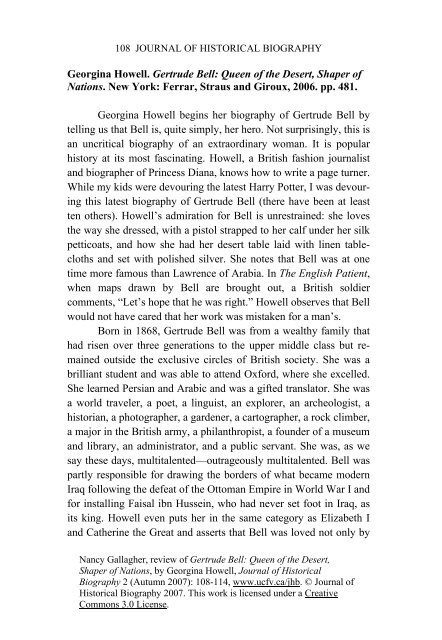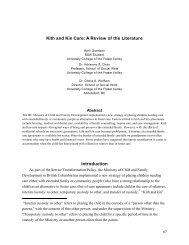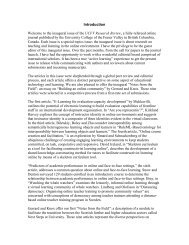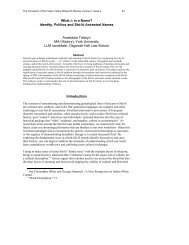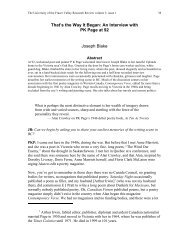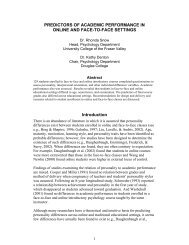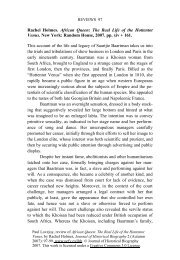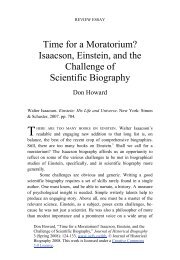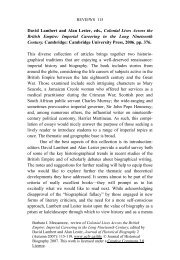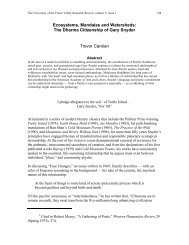Georgina Howell. Gertrude Bell: Queen of the Desert, Shaper of ...
Georgina Howell. Gertrude Bell: Queen of the Desert, Shaper of ...
Georgina Howell. Gertrude Bell: Queen of the Desert, Shaper of ...
Create successful ePaper yourself
Turn your PDF publications into a flip-book with our unique Google optimized e-Paper software.
REVIEWS 109her family, but by <strong>the</strong> people <strong>of</strong> Arabia. When she states, by way <strong>of</strong>pro<strong>of</strong>, that <strong>Bell</strong>’s name and her work for Iraq were recently reinstatedin that country’s school curricula, she does not mention that<strong>the</strong> revised textbooks were written by agencies under contract to <strong>the</strong>U.S. occupation forces. In <strong>Howell</strong>’s view, <strong>Bell</strong> “cajoled and intruded,guided and engineered, and finally delivered <strong>the</strong> <strong>of</strong>tenpromised and nearly betrayed prize <strong>of</strong> independence…. [and] leftbehind a benevolent and effective Iraq government, functioningwithout institutionalized corruption and intent on equality andpeace. In days when ‘Empire’ and ‘colonialism’ are dirty words,”she adds, “Britain has little to be ashamed <strong>of</strong> in <strong>the</strong> establishment <strong>of</strong>Iraq...” (xvii-xviii) <strong>Howell</strong> goes on to comment that <strong>the</strong> dynasty <strong>Bell</strong>put into place in Iraq lasted for thirty-two years, while Europeplunged into war after only thirteen. She tells us very little about <strong>the</strong>widespread revolts or <strong>the</strong> ruthless British repression that followed<strong>the</strong> imposition <strong>of</strong> <strong>the</strong> Hashemite king or about <strong>the</strong> thwarted hopes <strong>of</strong>Iraqi nationalists.<strong>Bell</strong> helped create <strong>the</strong> country that fills our daily news andleft behind an extensive correspondence, a diary kept over manyyears, a series <strong>of</strong> position papers, and eight books. She led anincredible life and documented it well. In short, <strong>Gertrude</strong> <strong>Bell</strong> is abiographer’s dream.In a critical review <strong>of</strong> a biography <strong>of</strong> Mark Twain, ChristopherHitchens once commented that <strong>the</strong>re are five cardinal rules inwriting biography. First, <strong>the</strong> biographer should make us want tohave known <strong>the</strong> person in question, or at least to get to know <strong>the</strong>person better through reading about his or her life. Second, <strong>the</strong>reader does not need to be burdened with <strong>the</strong> mundane details <strong>of</strong>everyday life that do not tell what makes <strong>the</strong> subject <strong>of</strong> <strong>the</strong>biography special. Third, <strong>the</strong> biographer should place <strong>the</strong> subject’slife in its historical context; we need to learn about <strong>the</strong> times tounderstand <strong>the</strong> life in question. And so much <strong>the</strong> better if we canmore thoroughly understand <strong>the</strong> times through <strong>the</strong> life story. Fourth,<strong>the</strong> biographer should allow his subject to be his or her quirky selfand not a reflection <strong>of</strong> <strong>the</strong> correspondence or reminiscences <strong>of</strong>
REVIEWS 113entirely honest when she wrote that she would support any governmentdesired by <strong>the</strong> Iraqi people. She knew who she wanted: her oldacquaintance Faisal, son <strong>of</strong> <strong>the</strong> sharif <strong>of</strong> Mecca and a leader <strong>of</strong> <strong>the</strong>British-sponsored Arab Revolt. <strong>Howell</strong>’s detailed account <strong>of</strong> <strong>the</strong>machinations that put Faisal on <strong>the</strong> newly created throne <strong>of</strong> Iraqinadvertently shows <strong>Bell</strong> to be quite an operator.<strong>Howell</strong> asks why a beautiful and wealthy woman in herprime would want to study difficult languages, explore dangerousterritory, and live in distant Muslim societies. She concludes that<strong>Bell</strong> did not want to be famous, to circulate in high society, or tocoast on her wealth and family position. She wanted to exercise hercuriosity, her intellect, and her need for challenge. Her early hopesfor marriage and family dashed, she pursued diversionary interests.For <strong>Howell</strong>, history presented <strong>the</strong> talented <strong>Bell</strong> with <strong>the</strong> opportunityto play a role in world affairs. I would say that British imperialpower and military force resulted in <strong>the</strong> creation <strong>of</strong> a country thatwas designed for <strong>the</strong> convenience <strong>of</strong> <strong>the</strong> imperial power ra<strong>the</strong>r thanits inhabitants. After she had seen to Faisal’s coronation and founded<strong>the</strong> Iraqi museum and library, she found herself lonely and bored.She was in poor health, and <strong>the</strong> future held little for her. <strong>Howell</strong>observes that both Lawrence and <strong>Bell</strong>, who loved and respected <strong>the</strong>Arabs, knew that <strong>the</strong> British promises made to <strong>the</strong> Arabs forindependence following <strong>the</strong>ir revolt against <strong>the</strong> Ottomans would bebroken. She notes that both became despondent and preoccupiedwith this dilemma for <strong>the</strong> rest <strong>of</strong> <strong>the</strong>ir lives. She perhaps shouldhave mentioned that both committed suicide.Does this biography, so compellingly told, pass Hitchens’sfive rules? Hitchens himself liked <strong>the</strong> book, but he does not seem tohave read it very carefully, nor did he apply his five rules to it.Writing for <strong>the</strong> Atlantic Monthly, he states that <strong>Bell</strong> would probablyhave married her second great love had he not been killed atGallipoli, glossing over <strong>the</strong> fact that <strong>the</strong> man was already marriedand had made clear to <strong>Bell</strong> his decision to remain in his marriage.Hitchens confidently intuits that <strong>Bell</strong> simultaneously wanted anddreaded to be rid <strong>of</strong> her virginity. How does he know that? He


